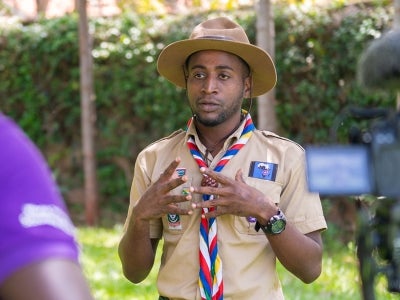
Photo courtesy of Katy Nascimento
Katy Nascimento is a student from São Tomé and Príncipe who will attend the 4th International Conference on Small Island Developing States in Antigua and Barbuda with support from the Global Environment Facility. In an interview, she talked traveling from her country for the first time to engage with policymakers and activists setting a course for the future of small islands.
What are you studying, and how does it relate to the environment?
I am a 19-year-old living in a Small Island Developing State where 60 percent of the population is under 25 years old. I'm enrolled in the third year of the international relations program at Universidade Lusíada de São Tomé e Príncipe.
I also work as a volunteer for UNICEF, with the Learning Passport project in the National Digital Learning Program. This project aims to provide educational content to children and young people living in remote communities. This initiative trains young people through volunteering, as a fundamental tool in the implementation of this and other initiatives for the sustainable development of São Tomé and Príncipe, making the country a pioneer in this approach.
When did you become interested in environmental issues?
I developed an early interest in environmental issues. I was four years old when I first participated in efforts to increase public awareness of the value of hand washing in rural areas. Since then, I have continued to advocate for social and environmental causes, teaching kids, teens, and young adults the value of environmental preservation.

Photo courtesy of Katy Nascimento
How has the climate crisis affected you?
In São Tomé and Príncipe, extreme weather events like storms and floods are becoming more regular, and my town is directly impacted by the climate catastrophe. Public health, food security, and daily living are all impacted by these changes. As a young activist, I recognize the pressing need for national and international action to lessen these consequences and safeguard our future.
What message do you have for today’s political or business leaders?
I would advise today's commercial and governmental leaders to put money into sustainable projects and education, particularly in developing nations like mine. In order for young people to create meaningful change in their communities, it is imperative that we assist and empower them. To address the climate catastrophe efficiently and fairly, we need laws and procedures that place a high priority on the environment.
Why is it important for you to be at SIDS-4? What are you most looking forward to?
Although I live in a small island state and have never left my country, I have always dreamed big and beyond borders. Going to Antigua and Barbuda for the SIDS conference is a big deal for me. It will give me the chance to talk about my experience and learn from other young people going through similar struggles. I'm excited to add to discussions that have the power to shape national and international legislation as well as regional approaches to climate resilience and sustainable development.
How do you spend your spare time?
Although I was awarded scholarships to continue my studies abroad, I decided to stay and do my degree here, as a way of inspiring and encouraging other young people not to lose hope and to believe that it is possible to dream big and do great things by staying in the country.
